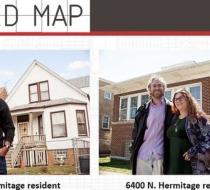The Folded Map Project Favorite
The Folded Map Project is a project by Tonika Lewis Johnson, a photographer and community activist from Chicago. The project aims to investigate and change the racial and economic segregation that affects the city and its residents.
The project started as a photographic study, where Johnson visually connected residents who live at corresponding addresses on the North and South Sides of Chicago. She called them “map twins” and showed how their neighborhoods and living conditions differed drastically. She also invited them to meet each other and have conversations about their experiences and perspectives.
The project quickly evolved into a multimedia exploration, where Johnson added video interviews, interactive maps, public events, and educational resources. She collaborated with the Department of Sociology and the Urban Data Visualization Laboratory at the University of Illinois at Chicago, as well as with various community organizations and institutions.
The project has received widespread attention and recognition, as well as funding from grants and donations. It has been featured in various exhibitions, publications, and media outlets. It has also sparked dialogue and action among Chicagoans and beyond, who are interested in addressing the issues of segregation, gentrification, and inequality.
The Folded Map Project is an example of artistic activism that uses creativity and culture to effect power. It challenges the status quo, exposes injustice, and inspires social change. It also creates bridges and solidarity among people who are separated by physical and social barriers.










